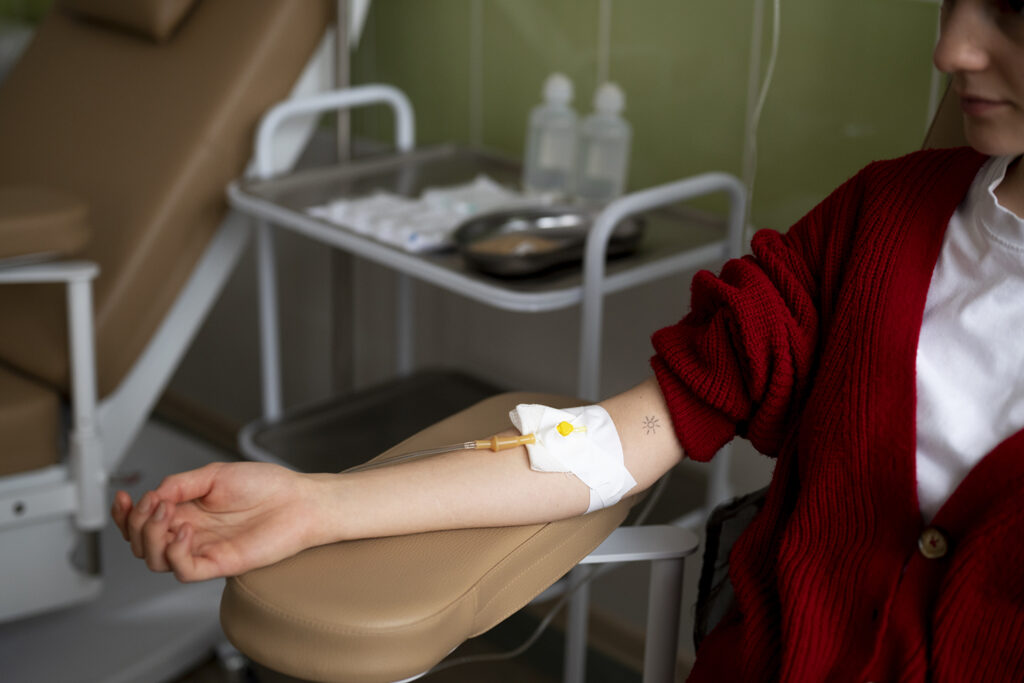Can I Donate Blood if I'm Diabetic?
Can I Donate Blood if I'm Diabetic?

If you’re diabetic, you may wonder whether you can donate blood. The good news is that in
many cases, people with diabetes can donate blood. However, there are some important
factors to consider before you roll up your sleeve.
General Eligibility for Diabetics
Most blood donation centers accept diabetic donors as long as their condition is well-
managed. This means that if your blood sugar levels are under control and you’re feeling
healthy, you are typically eligible to donate. Whether you control your diabetes through
medication, insulin, or lifestyle modifications, this doesn’t automatically disqualify you.
However, every donor must meet the general requirements set by the blood donation
organization, which include factors like age, weight, and overall health.
What to Know Before Donating?
If you take insulin, some donation centres may ask for additional information. For example,
the American Red Cross allows insulin users to donate as long as their diabetes is controlled,
but other organizations might have stricter rules. It’s important to check the specific
guidelines of the blood donation centre you plan to visit.
Moreover, if you have complications related to diabetes, such as kidney disease, eye
problems, or poor circulation, these could affect your eligibility. Donation centers may be
concerned about the health impact on you, not just the safety of the blood.
Diabetes Patients Must not donate if:
- Requires treatment with insulin.
- Diabetes medication has been altered in the last four weeks.
- Is having problems with feeling faint, fainting or giddiness.
- Has suffered from heart failure.
- Has renal impairment requiring dialysis, the use of erythropoietin or similar drugs, or is
either under active investigation or continued follow up for renal impairment. - Has required surgery for a blocked or narrowed artery including any type of amputation.
- Has or has had gangrene.
- Has or has had ulcers or wounds related to a loss of sensation.
- Has had a transplant of pancreatic tissue.

Managing Your Health
Before donating, make sure you are feeling well and have eaten a healthy meal. It’s also
crucial to stay hydrated. After donating, monitor your blood sugar closely, as the donation
process can sometimes cause fluctuations.
Always consult with your doctor before donating blood if you have diabetes. With proper
precautions, many diabetics can safely give the gift of life.
2.Joint United Kingdom (UK) Blood Transfusion and Tissue Transplantation Services Professional Advisory Committee.https://www.transfusionguidelines.org /dsg/wb/guidelines/di003-diabetes-mellitus Accessed on 26 August 2024.
Get a Call Back
Categories
- Life Style Modification
- Cardiac
Health Blogs
The Benefits of Early Dinners: A Blend of Tradition and Science
The Benefits of Early Dinners: A Blend of Tradition and Science The Benefits of Early Dinners: A Blend of Tradition and Science In today’s fast-paced world, meal timing often
Kitchen Cures: Healing the Natural Way with Grandma’s Wisdom
Kitchen Cures: Healing the Natural Way with Grandma’s Wisdom Kitchen Cures: Healing the Natural Way with Grandma’s Wisdom Who doesn’t love quick, easy solutions to nagging he
Why Eating Nuts Before Meals is a Smart Choice
Why Eating Nuts Before Meals is a Smart Choice Why Eating Nuts Before Meals is a Smart Choice Adding a handful of nuts to the diet, especially before meals, can provide several hea
The Surprising Secret to Coffee’s Heart-Healthy Benefits: It is All About Timing
The Surprising Secret to Coffee’s Heart-Healthy Benefits: It is All About Timing The Surprising Secret to Coffee’s Heart-Healthy Benefits: It is All About Timing For many, the
5 Simple Morning Habits for a Healthier Start to the Year
5 Simple Morning Habits for a Healthier Start to the Year 5 Simple Morning Habits for a Healthier Start to the Year A new year offers a fresh opportunity to embrace healthier habit
Type 2 Diabetes and Mental Health: The Connection
Type 2 Diabetes and Mental Health: The Connection Type 2 Diabetes and Mental Health: The Connection Type 2 diabetes mellitus (T2DM) is a chronic condition affecting millions worldw
Is Sugar Really the Enemy? Unpacking Diabetes Myths
Is Sugar Really the Enemy? Unpacking Diabetes Myths Is Sugar Really the Enemy? Unpacking Diabetes Myths Diabetes is a growing public health concern worldwide, with type 2 diabetes
Tailoring the Dose of Exercise for Effective Glycemic Management in Type 2 Diabetes
Tailoring the Dose of Exercise for Effective Glycemic Management in Type 2 Diabetes Tailoring the Dose of Exercise for Effective Glycemic Management in Type 2 Diabetes Type 2 diabe
Ganesh Chaturthi and Diabetes: A Balancing Act
Ganesh Chaturthi and Diabetes: A Balancing Act Ganesh Chaturthi and Diabetes: A Balancing Act Ganesh Chaturthi, a vibrant and beloved Indian festival celebrated with great enthusia
Asthma in Children: Symptoms, Triggers, and Management
Asthma in Children: Symptoms, Triggers, and Management Asthma in Children: Symptoms, Triggers, and Management Asthma is a significant health concern among children in India, with i
Heart-Healthy Diet: Foods to Include and Avoid
Heart-Healthy Diet: Foods to Include and Avoid Heart-Healthy Diet: Foods to Include and Avoid India’s traditional diet is often heavy on carbohydrates, high-fat dairy product
Can I Donate Blood if I’m Diabetic?
Can I Donate Blood if I’m Diabetic? Can I Donate Blood if I’m Diabetic? If you’re diabetic, you may wonder whether you can donate blood. The good news is that inmany
Top Foods for Managing High Blood Pressure
Top Foods for Managing High Blood Pressure Top Foods for Managing High Blood Pressure High blood pressure is a common condition that affects millions of people worldwide. If left u
Loneliness and Diabetes: How Social Isolation Raises Your Risk
Loneliness and Diabetes: How Social Isolation Raises Your Risk Loneliness is a mental health problem that has been proven to have a significant impact on quality of life and health
Navigating Winter with Asthma in India: Tips for a Breath-Friendly Season
Navigating Winter with Asthma in India: Tips for a Breath-Friendly Season As winter sets in across India, individuals with asthma face unique challenges in managing their respirato
What is the optimal level of low-density lipoprotein (LDL) cholesterol for individuals living with heart disease?
What is the optimal level of low-density lipoprotein (LDL) cholesterol for individuals living with heart disease? LDL is considered as “bad” cholesterol as it accumulates in th
Diwali Delights: Navigating Healthy Celebration with 10 Essential Tips
Diwali Delights: Navigating Healthy Celebration with 10 Essential Tips Diwali, the festival of lights, is a time of joy, togetherness, and of course, indulgence in delicious sweets
Coping with COPD: Tips for Living Well with Chronic Obstructive Pulmonary Disease
Coping with COPD: Tips for Living Well with Chronic Obstructive Pulmonary Disease Chronic Obstructive Pulmonary Disease (COPD) is a chronic respiratory condition that can significa
How to live a healthy life after cancer?
How to live a healthy life after cancer? Cancer is definitely a debilitating disease that compromises our life’s quality and length of survival.The experience with cancer is uniq
Managing Glucose and Stress in Women with Type 2 Diabetes
Managing Glucose and Stress in Women with Type 2 Diabetes: The Power of Aerobic Exercise and Deep Breathing Diabetes is a type of metabolic disease. It has a strong connection with
Safe and Effective Exercises for Asthma Management
Safe and Effective Exercises for Asthma Management Safe and Effective Exercises for Asthma Management Asthma is a chronic lung condition that affects the airways, making it difficu






















